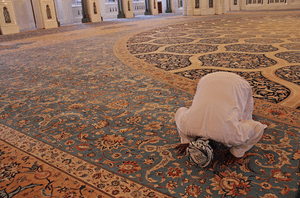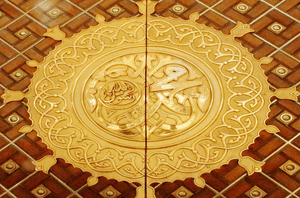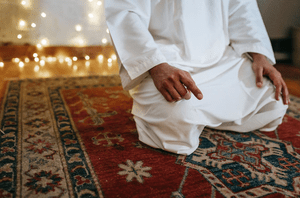Pray on Time
Plan your day around ṣalāh. Instead of trying to fit ṣalāh in your busy schedule, make your day revolve around ṣalāh, and aim to always pray on time. Praying ṣalāh at its beginning time will be an indication of you – mentally and physically – giving it the importance it deserves. It will also safeguard against rushing through ṣalāh as you won’t worry about whether or not you have sufficient time. Allah (‘azza wa jall) says, “So woe to those who pray, but are heedless of their prayers” (107:4-5). According to the scholars, this either refers to (a) those who neglect their prayer by not praying at all, or (b) those who delay it all or most of the time.
The Prophet ﷺ said, “That is the ṣalāh of the hypocrite. He sits watching the sun, until when it is between the horns of the Shayṭān, he stands and pecks up and down [i.e. rushes] in the four rakʿahs of prayer, and hardly remembers Allah in them” (Muslim).
The Prophet ﷺ always hastened to the masjid when it was time for ṣalāh. Occasionally, he would be spending time with his family, but on hearing the mu’addhin’s call to prayer, he would immediately get up and leave them. ʿĀ’ishah (raḍiy Allāhu ‘anhā) says, “He ﷺ would be in the service of his family and when he would hear the adhān, he would leave” (Bukhārī).
Yearning for Allah (‘azza wa jall) and longing to spend time with Him has always been a hallmark of the pious slaves of Allah (‘azza wa jall).
“No time for prayer has ever arrived except that I have already made preparations for it. And never has it arrived except that I am eagerly looking forward to it.” – ʿAdī b. Ḥātim (raḥimahullāh)
Pray in the Congregation
Strive to pray in the congregation as much as possible. The Messenger of Allah ﷺ said, “The prayer in congregation is twenty-seven times superior to the prayer offered by the person alone” (Bukhārī).
It is however, more virtuous for a woman to pray at home than in the masjid.
In another ḥadīth, he ﷺ warned, “Whoever hears the adhān and does not come (to the masjid), his ṣalāh is not valid, unless if he has an excuse” (Abū Dāwūd). When ʿAbdullāh b. ʿAbbās (radiy Allāhū ‘anhumā) was asked about what constitutes an excuse he replied, “Illness or fear.”
Always aim to arrive early, before the opening takbīr (takbīrat al-taḥrīm). The Prophet ﷺ said, “Whoever performs ṣalāh for Allah for forty days in the congregation, catching the first takbīr, he will be recorded as being free from two things: free from the Hell-fire and free of hypocrisy” (Tirmidhī). Moreover, he ﷺ also said, “A Muslim is not regular in attending the masājid for ṣalāh and dhikr, except that Allah welcomes him happily just as people welcome their loved ones happily upon their return from a journey” (Ibn Mājah).
Saʿīd b. al-Musayyib (raḥimahullāh) said, “For thirty years, the mu’addhin has not made the call to prayer except that I have already been in the masjid.”
Muḥammad b. Samāʿah al-Tamīmī (raḥimahullāh) said, “I did not miss the first takbīr for forty years except for once: the day when my mother passed away.”
“When you see a man who is careless in regards to the first takbīr, then wash your hands of him.” – Ibrāhīm al-Taymī (raḥimahullāh)
“Coming to ṣalāh before the iqāmah is an indication of you honouring ṣalāh.” – Sufyān b. ʿUyaynah (raḥimahullāh)






